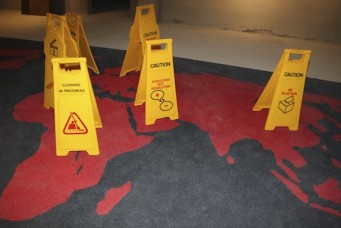Political Order and Political Decay
Francis Fukuyama and the Dream of Democracy.
Francis Fukuyama is best known as the political theorist who, at the age of 36, declared that we had reached the end of history. It was 1989, the Berlin Wall was about to fall, and Fukuyama, then a member of the State Department’s Policy Planning unit, wrote an essay in the National Interest arguing that liberalism faced no real competitors: it is humanity’s ideological endpoint.
Twenty five years after Fukuyama wrote that career-defining essay—“The End of History?”—it seems that mankind might sooner colonize Mars than establish universal democratic freedom on Earth. His critics have pointed to events such as the Rwandan genocide, the Balkan wars, and the September 11, 2001, attacks as evidence that his theory is flawed, yet Fukuyama has not wavered. Just because all societies will eventually aspire towards democratic ideals, he argues, it doesn’t follow that it’s easy to make democracy work.
This is the departure point for Political Order and Political Decay, the second in Fukuyama’s two-volume series tracing the development of political institutions from tribalism to the modern state. It is preoccupied with one central question: how do countries “get to Denmark?”—although Fukuyama is less concerned with the actual nation than with the Denmark of liberal policymakers’ dreams, the ultimate example of a prosperous, stable, and accountably governed society.
Political Order and Political Decay is not a how-to guide—the Scandinavian country can’t be broken down into component parts and re-assembled at home like a piece of Ikea flat-pack furniture. Instead, in a remarkable demonstration of academic scope and assiduousness, Fukuyama explores global political history, from the industrial revolution to the modern day, in search of clues on the mechanisms of political change.
According to Fukuyama, the three elements of a successful modern democracy are a legitimate and effective state, the rule of law, and democratic accountability. Countries exhibit these to various degrees. Take China, which has a highly effective state but a lack of democratic accountability. In India, the reverse is more true: its democratically elected leaders struggle, thanks to institutionalized corruption and bureaucratic incompetence, to get anything done.
Fukuyama does not single out a particular driving force behind political development, which he sees as a complex interplay of economics, culture, geography, climate, conflict, political personalities, and luck. He does, however, identify patterns. He offers, for instance, an interesting study into how different patterns of colonial rule in Sub-Saharan Africa, Southeast Asia, and Latin America have affected state development in these areas.
“The problem is that Denmark didn’t get to be Denmark in a matter of months and years,” Fukuyama writes. “Contemporary Denmark—and all other developing countries—gradually evolved modern institutions over centuries.” This means that attempts to impose institutions on countries from the outside rarely succeed. An underlying theme to Fukuyama’s latest work is the importance of humility and the need for policymakers to accept their limitations. In this way, Fukuyama is striking out at two sets of former colleagues.
The first are America’s neoconservatives, of which Fukuyama was once a leading light. He was an enthusiastic supporter of the U.S.-led invasion of Afghanistan, but by 2004 he was so disillusioned by the “liberation” of Iraq that he wrote an essay in the National Interest, later turned into the book America at the Crossroads: Democracy, Power, and the Neoconservative Legacy, criticizing his former colleagues. Ten years on, a number of his former neocon friends still aren’t speaking to him.
Western forces have found it relatively easy to impose the mechanisms of accountable government in Iraq and Afghanistan, he argues: both have parliaments, political parties, and periodic elections. It is much harder, however, to create states that are seen as legitimate, or to impose the rule of law—even when, as in Iraq and Afghanistan, billions of dollars are funnelled into state-building programs.
He also criticizes the international development community, including the World Bank (where he once worked), whose attempts at promoting democratic reform are often inept and sometimes counter-productive. Rarely do outsiders possess the knowledge needed to successfully reform institutions—and it makes little difference whether well-intentioned NGO workers are aiming to import foreign institutions or simply to reform or formalize existing local ones. Only “indigenous actors” are sufficiently aware of the “constraints posed and opportunities presented by their own history and traditions,” he writes.
Even when countries do “get to Denmark,” or somewhere close, they may not remain successful democracies forever. To complete his apparent campaign to annoy everyone he’s ever worked with, Fukuyama draws on his experience at the State Department to show how American politics has decayed. All political systems are subject to decay: laws and institutions often struggle to keep up with social change, and elites are always looking for ways to re-assert control and recapture the state. In the United States this means that well-heeled and well-organized lobby groups exert too much power, and the constitutional emphasis on “checks and balances” has been exploited to produce a “vetocracy” that paralyzes governance. Fukuyama believes this process is not irreversible, but no one currently seems to possess the political will and grit to force through needed reform.
For a thinker who once epitomized American triumphalism in the aftermath of the Cold War, Fukuyama sounds almost defeatist. He concedes that some countries may never reach “Denmark” and others will decay, which prompts the question: why is Fukuyama so sure that history has an “end” at all? Why should there be any guiding idea, or ideology, driving the apparent chaos of political change? Fukuyama often comes under fire for failing to account for how liberalism might survive a radically altered future—perhaps one in which technological change drives ever widening levels of inequality.
Yet it’s hard to reconcile a commitment to liberal ideals with a belief that democratic rights should be something other than universal. For Fukuyama, liberalism is not just an instrumental good, it has an intrinsic value, too. Democracy recognizes individuals’ “dignity as agents,” he writes. “Political agency is an end in itself, one of the basic dimensions of freedom that complete and enrich the life of an individual.” If you believe this, it is not easy to see why humanity should strive for any political system that fails to recognize individuals as agents, and not subjects, who ought to have a stake in their political future and the freedom to live their lives in the fullest possible sense.
If only Political Order and Political Decay could be pushed into the hands of political leaders, NGO workers, and policy wonks worldwide. They might find it a dense, challenging read at points, but it would hopefully leave them with both a much-needed sense of humility and a renewed awareness of the preciousness of liberal democracy.
Sophie McBain is an assistant editor at the New Statesman. She has written for the New Republic, FT Weekend,Guardian, Monocle, and Spear’s. From 2008 to 2011 she worked as communications assistant for the United Nations Development Programme and as a consultant for the African Development Bank based in Tripoli, Libya. On Twitter: @SEMcBain.
Subscribe to Our Newsletter





